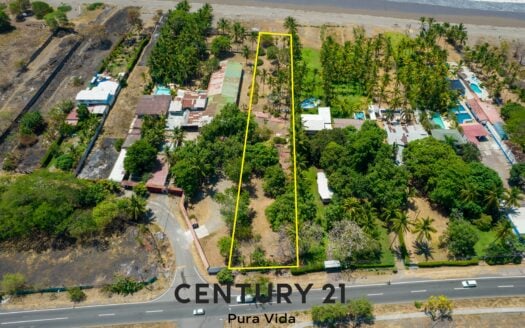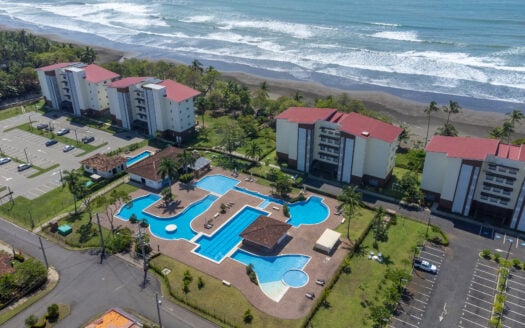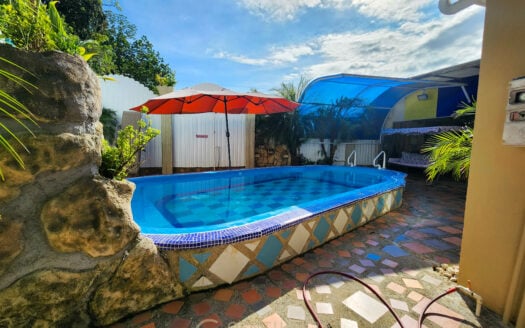Are you considering buying real estate in Costa Rica but don’t know where to start? Navigating the real estate market in a foreign country can be overwhelming and confusing, especially if you’re not familiar with local laws and customs. But don’t worry, with the right information and guidance, buying real estate in Costa Rica can be a straightforward and rewarding experience.
In this article, we’ll guide you through the process of buying real estate in Costa Rica. We will help you understand why each step is necessary. This should help you gain a better understanding of the processes involved. So, let’s get started and make your dream of owning property in paradise a reality!
Researching The Market
Costa Rica is a paradise of opportunity for potential real estate buyers looking to take the plunge into foreign property markets. Uncovering the secrets that lie within its lush coastal jungles and majestic mountain peaks can be like finding buried treasure, as long as you know where to look
- Get familiar with foreign buyer regulations.
- Understand how laws may affect purchasing decisions or ownership rights.
- Research what financing options will best suit you when investing in a new country.
- Familiarize yourself with local customs before making any commitments.
- Knowledge about things such as property taxes and fees is essential for successful transactions.
- Start doing a comprehensive search via property search engines and listings
- Get professional assistance (optional)
The internet has revolutionized house hunting by providing access to luxury homes all over Costa Rica from the comfort of your own home.
Property search engines abound online offering everything from condos near beaches to villas atop hillsides–all ready for viewing at a click! Real estate agents throughout the country offer another great service if you prefer more personalized assistance while venturing out on viewings or making offers on certain properties.

Finding A Real Estate Agent
Finding a real estate agent is an important step in the buying process of real estate in Costa Rica. An experienced and knowledgeable broker can save time, money, and stress by guiding you through the process.
- Research real estate companies that specialize in expat-owned properties in the desired location.
- Thoroughly research a broker’s background to make sure they have experience with local ownership rights and title searches.
- Ask how long the broker has been operating, and if there are references from satisfied clients available.
- Assess the level of service that can be expected during the buying process, as well as any extra fees or services offered beyond just finding an investment property.
- Make sure the broker is familiar with foreign buyer regulations, taxes, and fees associated with purchasing real estate in Costa Rica.
Another important factor to consider is whether or not the company specializes in helping foreigners purchase property in Costa Rica. Some real estate agencies may only focus on selling residential homes while others may offer more specialized services such as commercial investment opportunities or vacation rentals. Knowing which type of property you want to buy will help make selecting a broker easier since some companies may be better suited for certain types of transactions than others.
Gathering Necessary Documents
When buying real estate in Costa Rica, it’s essential to have the right documents.
- Tax stamps for luxury homes
- Registration stamps for all other properties
- Property survey
- Diligence report from lawyer
- Copy of passport and residency card
- Certificate of non-liens or encumbrances
- Signed purchase contract and deed
- Proof of financial ability to purchase the property
- Official statement from the local municipality on zoning rights and restrictions
Having the correct documentation is key when purchasing real estate in Costa Rica. Thankfully, local lawyers can provide guidance on what paperwork will be needed during the transaction process. They’ll also advise on applicable taxes like documentary stamps or luxury home tax – depending on what type of property you are investing in.
When considering any potential purchase, you should always look into obtaining legal advice about the condition of the property before signing off on anything. It’s important to know exactly what you’re getting yourself into before making such an expensive commitment! A reputable attorney can provide peace of mind by helping ensure that everything is up-to-date according to current regulations and laws.
Completing Due Diligence
Real estate buyers in Costa Rica should make sure they complete due diligence before making an offer. There is no such thing as a real estate purchase without some sort of research and investigation into the property itself, the seller’s information, and any other related details that could affect the deal.
- Visit the public registry office where you can access all registered titles and documents on file for both Costa Ricans and foreigners. This will provide valuable insight into who owns the land and if there are any liens or mortgages against it.
- Research the property: Is it in good condition? Are there any restrictions on developing or renovating the land? Does it have access to water, electricity, and other amenities?
- Get a copy of the title deed: Make sure that it is up-to-date and that all parties involved are named correctly.
- Verify the seller’s information: Ensure that they are the rightful owner of the property and have all necessary documents to proceed with the sale.
- Have a lawyer review legal documents: An experienced lawyer can make sure that everything is in order before signing off on anything – from contracts to title deeds.
- Conduct a survey: Surveyors will help ensure that everything is accurate and properly mapped out before purchase.
- Get an official statement from the local municipality: This will provide details about building rights, zoning regulations, taxes, and other important information about owning property in Costa Rica.
Diligence checks need to be conducted thoroughly during this process too. Researching zoning laws, taxes, deed restrictions, building permits, road access issues, water rights, etc., are all part of being diligent when buying real estate in Costa Rica as a foreigner. A lawyer or experienced advisor may also help out with these tasks by providing additional advice and guidance tailored specifically to your situation.
Making sure everything has been taken care of properly before moving forward makes smart business sense whether you’re from Costa Rica or abroad looking to purchase property here! All necessary steps must therefore be taken for the successful completion of the due diligence phase before even thinking about making an offer. Ready? Let’s move on to what comes next – making an offer!

Making An Offer
With a thorough understanding of the property, it is now time to make an offer for real estate in Costa Rica. Before taking this step, potential buyers should consult with local real estate attorneys and double-check all boundary lines to ensure accuracy. Additionally, engaging a rental property manager or visiting a reputable real estate office can be beneficial while searching for homes or apartments that are available for sale.
Here is an overview of how making an offer works:
- Understand the property market value you intend on buying
- Contact the seller to provide details regarding your offer
- Negotiate contract terms such as closing costs and financing options
- Come to an agreement between both parties
Making an offer involves more than just agreeing on a price; it’s about creating mutually beneficial conditions for both buyer and seller. When considering different offers from prospective buyers, sellers may take into account factors like earnest money deposits, prequalification letters from lenders, and flexible move-in dates.
Buyers must also consider their own financial capabilities when negotiating terms so they don’t overextend themselves. It’s essential to have a strong understanding of one’s current financial situation before jumping into any transaction.
By preparing beforehand and educating oneself on what to expect during the process of making an offer, buyers increase their chances of finding success in Costa Rican real estate purchasing opportunities. Through diligent preparation and research, buyers will be better equipped with knowledge and confidence as they look forward to negotiations that could lead them closer to owning their dream home or investment opportunity abroad.
Negotiating The Offer
Negotiating the offer when buying real estate in Costa Rica can be a tricky business. It’s important to consider public land, financial transactions, and ease of ownership when investing in property here. Many buyers seek advice from a reputable real estate attorney before making any offers on properties as this is a common practice.
In addition, it is wise to have an experienced closing attorney who understands local customs and laws involved with purchasing real estate in Costa Rica.
Checklist for negotiating offers:
- Negotiate contract terms such as closing costs, financing options, earnest money deposits, prequalification letters from lenders, and flexible move-in dates
- Consult a qualified real estate attorney to double-check all boundary lines and ensure accuracy
- Put together an attractive package that stands out among other potential buyers (offer more money upfront, shorter contingency periods)
- Sign all documents related to the sale (contracts, deeds, titles) and pay the deposit amount agreed upon in the contract
- Follow through with all legal requirements needed for the transfer of title of the property
- Obtain title insurance and cover closing costs associated with the purchase
When you are ready to make your offer, it is best to put together an attractive package that stands out among other potential buyers. This could include offering more money upfront or less time for contingencies like inspections and financing approvals. Once the seller has accepted your offer, they will typically provide documentation that outlines the terms of agreement between you two parties.
Your next step should be signing all documents related to the sale – including contracts, deeds, and titles – then pay the deposit amount agreed upon in your contract. At this stage, both sides must take care not to break any laws by following through with all legal requirements needed for the transfer of title of the property. Your closing attorney should help guide you through these steps if there are any questions regarding paperwork or taxes owed during the transaction process.
Finally, now that everything has been signed off on and approved, it’s time to move forward with obtaining title insurance and covering closing costs associated with the purchase of your new home in Costa Rica!
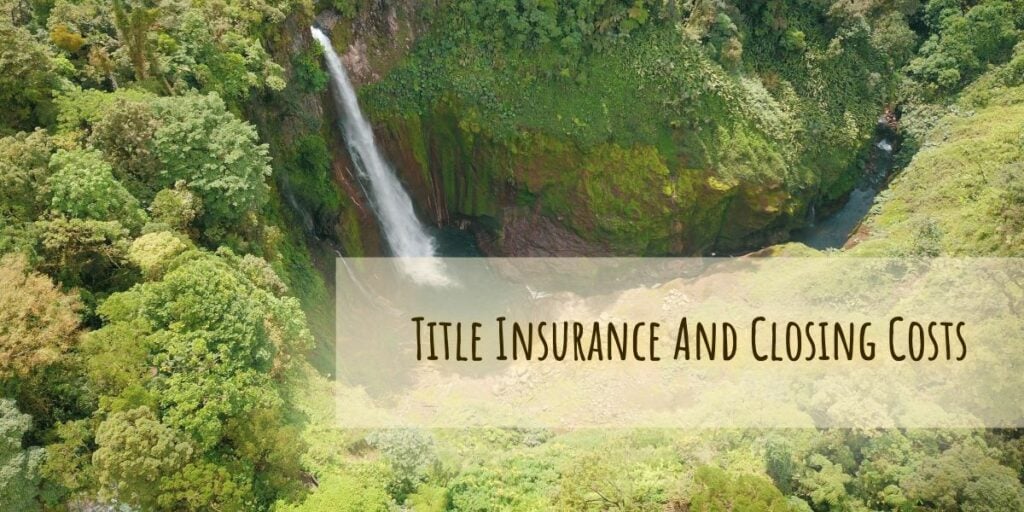
Title Insurance And Closing Costs
Negotiating the offer for a real estate purchase in Costa Rica is like opening a door to freedom. After this important step comes title insurance and closing costs, which are necessary steps to ensure that the entire process runs smoothly.
In Costa Rica’s system of private ownership, these fees must be paid before registering a property deed with the public registry. The average cost of registration fees can vary depending on the location and financial transaction involved with an estate for sale; however, it typically ranges between 1-3% of the total price.
Title insurance covers any unforeseen issues related to rights of possession or existing liens against the property. It also protects both parties from potential legal disputes arising out of ownership claims made by third parties after closing.
Closing costs include transfer taxes, notary charges, appraisal fees, and other administrative expenses needed to complete the transaction. When all these conditions have been satisfied, buyers will receive their keys upon signing all documents required under Costa Rican law.
Transferring Funds And Obtaining Keys
Depending on where you purchase, the process for transferring funds and obtaining keys can vary slightly. To begin investing in Costa Rica, there are some documents needed before the sale is finalized. This includes registration forms with the National Registry Office or Registro Nacional and proof of payment from both parties involved. Also, depending on your local laws, you may need additional paperwork when dealing with foreign entities such as a Power of Attorney document if an accounting assistant is involved in the transaction.
After submitting all necessary documents, buyers should expect to receive their keys within 3-5 business days once they have transferred money into an escrow account set up by either side’s lawyer. In addition, buyers will also be provided with receipts showing proof of transfer and payments made which must remain valid until after title transfers hands officially at closing time.
The process of buying real estate in Costa Rica requires patience but can ultimately lead to owning coastal properties in one of the most desirable countries in Latin America! From here, prospective buyers should move on to researching tax implications for foreign buyers before making any final decisions about purchasing property abroad.
Frequently Asked Questions
What is the average cost of buying real estate in Costa Rica?
The price of real estate in Costa Rica depends on many factors, including location and size. Generally speaking, however, you can expect to pay anywhere from $50,000 to more than $1 million depending on where you buy property and how much land you are looking for. Here are three key considerations when trying to determine the average cost of purchasing property:
* Location – The area where you want to buy will greatly affect the overall cost. Buying beachfront property near popular tourist areas such as San Jose or Guanacaste will likely be pricier than other parts of the country that aren’t as well-known or desirable.
* Property Size – Another factor is how much land you need or want; if you’re just looking for a modest plot with minimal amenities then costs can range significantly lower than larger properties with multiple bedrooms and bathrooms. In some cases, smaller pieces of land might even fall under the $50K mark!
* Amenities & Upgrades – If your goal is to add value and luxury features like swimming pools, outdoor kitchens, decks/patios, etc., these upgrades must also be taken into account when calculating the total cost of buying real estate in Costa Rica.
All things considered, most people who decide to purchase property in Costa Rica should budget between $100K and $300K at a minimum – but again this largely depends on what type of space they’re looking for and their desired level of comfort. Whether it’s a primary residence or a second home abroad, there are plenty of options available for those interested in investing in Costa Rican real estate.
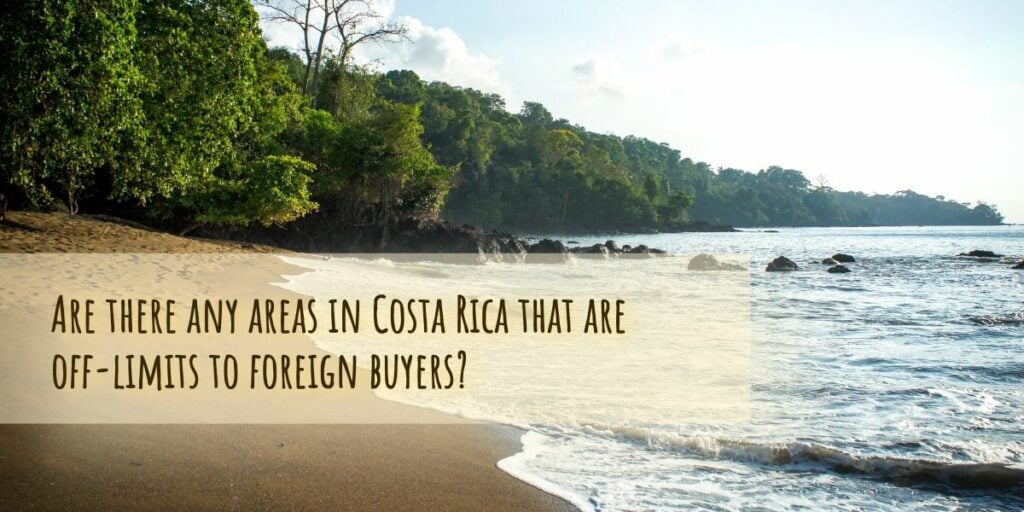
Are there any areas in Costa Rica that are off-limits to foreign buyers?
Are there any areas in Costa Rica that are off-limits to foreign buyers? This is a question many potential investors may be asking when considering real estate options in this tropical Central American nation. Fortunately, the answer is no; most of Costa Rica’s stunning landscape and diverse cities are open to international investment. However, that doesn’t mean you can buy anywhere you want without restrictions.
Despite its welcoming attitude towards overseas property owners, Costa Rica does have some regulations around where foreigners can purchase land or buildings. These laws exist to protect locals from being priced out of their own housing market by large purchases by non-residents with more disposable income than they possess.
For example, while anyone can buy beachfront condos near popular tourist destinations such as Jaco Beach or Manuel Antonio National Park, buying up lots on the prime oceanfront property along the country’s coastline is forbidden for those who do not hold citizenship or residency rights in Costa Rica.
Additionally, certain protected areas within the country—such as national parks and other wildlife sanctuaries—are closed off entirely to outside buyers. All prospective purchasers must also take into consideration the restrictions placed on them due to zoning laws that prevent construction in parts of the countryside deemed unsuitable for development projects.
Finally, it should be noted that foreign nationals looking to invest in rural agricultural land will need special permission from government authorities before proceeding with any real estate transactions – so make sure your lawyer has all the necessary paperwork ready before signing on the dotted line!
Are there restrictions on how much land a foreign buyer can buy in Costa Rica?
Are there restrictions on how much land a foreign buyer can purchase in Costa Rica? This is an important question to consider when considering moving to the beautiful country. It’s no secret that many people are attracted to its lush landscapes and vibrant culture, but understanding any limits or regulations put in place by the government before making such a commitment is essential.
The good news is that foreign buyers have several options available for purchasing real estate in Costa Rica. Depending on their residency status, they may be able to buy as much land as they want without having to meet any additional requirements. For those who do not hold permanent residency, however, there are certain limitations that must be met before buying large tracts of land.
In general, foreigners can only own up to 50 hectares (approximately 123 acres) of rural land without special permission from the government. Additionally, non-residents cannot acquire more than 25% of agricultural lands within 5 kilometers of existing towns or cities unless it has been authorized by the National Institute of Development (IND). Foreigners looking to purchase larger plots should contact IND directly to determine if their plans will be approved.
Despite these few restrictions, foreign investors still have plenty of opportunity to make investments in one of Latin America’s most fascinating countries. With so much natural beauty and cultural diversity, Costa Rica is an attractive destination for people hoping for a fresh start abroad – and with careful planning and research into all relevant laws and regulations, investing in property here can be both rewarding and hassle-free.
Is there a minimum or maximum amount of time a foreign buyer must stay in Costa Rica after buying a property?
Buying property in a foreign country can feel like navigating uncharted waters – the investment is often substantial and the regulations are sometimes unknown. For those looking to buy real estate in Costa Rica, one of the key questions they may have is if there is a minimum or maximum amount of time that must be spent in Costa Rica after buying a property.
The answer to this question depends on several factors, ranging from what type of visa you hold to where your property is located. Generally speaking, as long as you remain within the legal limits for residency requirements (which vary depending on nationality), it’s possible to stay in Costa Rica indefinitely after purchasing a property.
If you’re considering an extended stay in the area, obtaining a residency permit will ensure that your rights as a resident are protected. The application process typically requires proof of income and/or investments, along with other documents such as valid passport photos and copies of official papers proving good standing with local authorities. Depending on how quickly you need approval, processing times will vary; however, most applications take between two and six months before being approved.
Living abroad offers many benefits beyond just owning property; it provides freedom, connection with diverse cultures, new perspectives, and personal growth opportunities that come only when venturing into unfamiliar territory. With careful planning and research beforehand, anyone interested in living in Costa Rica has the potential to live out their dream without worrying about their ability to stay longer than intended once they’ve bought their home away from home.
Conclusion
Knowing how to buy real estate in Costa Rica is the first step to unlocking the potential of this amazing country. Foreigners have several options available, from a property purchase of up to 50 hectares of land without special permission to obtaining a residency permit if they are interested in staying for an extended period of time. With careful research into all relevant laws and regulations, purchasing property in Costa Rica can be both rewarding and hassle-free.
Costa Rica buying property is an exciting opportunity and a great way to start a new life abroad. With careful planning and research, anyone can make their dream of buying a Costa Rica property a dream come true.
Costa Rica real estate is an excellent investment opportunity and with careful research, anyone can find their ideal home away from home. With the right knowledge and support, investing in Costa Rica can be a great way to start a new life abroad with plenty of rewards.


